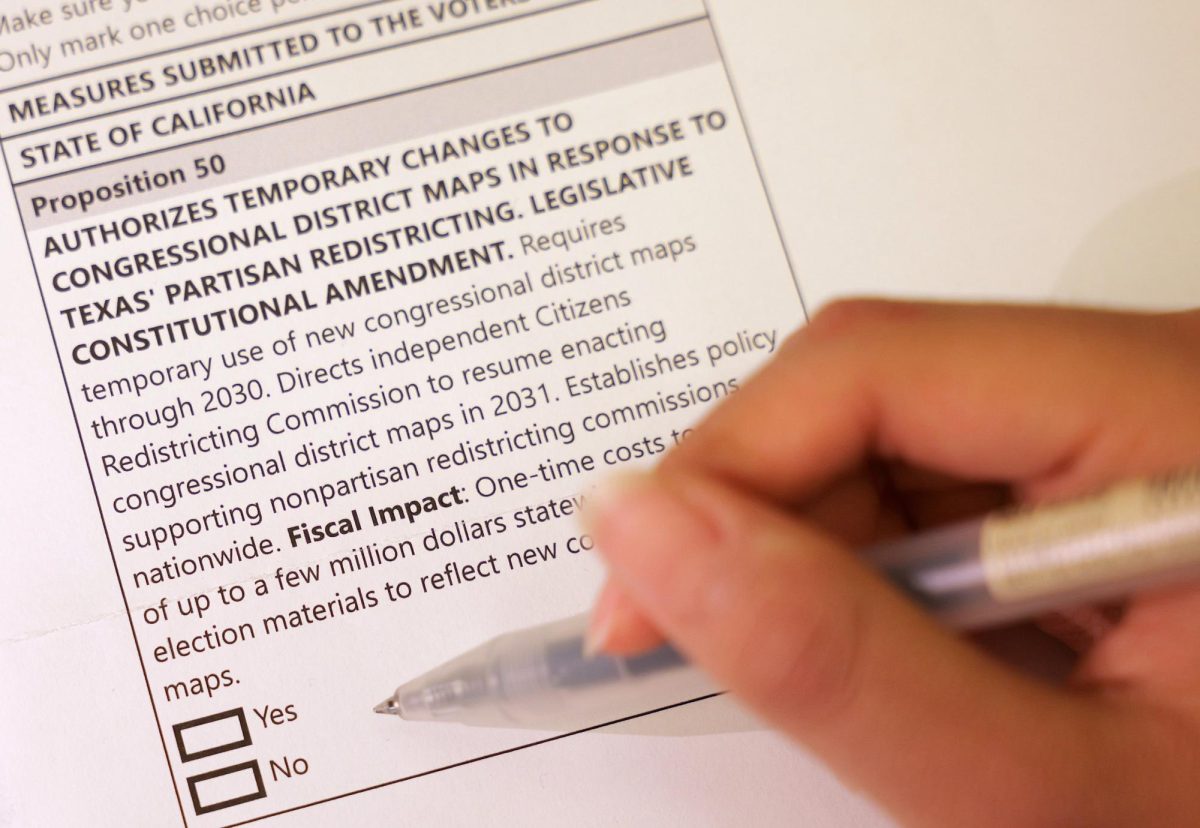As the special election for Proposition 50 draws closer, one group in Orange County is watching the build-up to the ballot’s vote especially closely: Orange County’s university professors.
On Nov. 4, California residents will vote on Prop. 50, otherwise known as the Election Rigging Response Act, a measure proposed by California Gov. Gavin Newsom in response to Texas’s redistricting efforts. If passed, the proposition will redraw California’s voting districts, including Brea’s, and flip five congressional districts in favor of the Democrats.
The drawing of district maps in California has been overseen by the California Citizens Redistricting Commission (CCRC), a 14-member commission implemented by Proposition 11, also known as the 2008 Voters FIRST Act, intended to prevent gerrymandering and create districts with equal population and fair representation of communities. Prop. 50 temporarily overrides this independent commission.
“The biggest issue is how this plan impacts the balance of Congress and what that means for national politics,” Dr. Sarah Hill, California State University, Fullerton, Associate Professor of Political Science, told the Wildcat via email. “Prop. 50 would allow the California Legislature once again to draw the state’s congressional districts, but only through 2030; after the next Census, the maps will again be drawn by the CCRC.”
The ballot is part of a broader national battle intended to counter redistricting in Texas by Gov. Greg Abbott, at the behest of President Donald Trump.
If it garners a majority vote, Prop. 50 will undo Republican redistricting efforts and narrow the representatives in Congress from the current 219 Republicans to 213 Democrats, to 219 to 218.
Within California, new congressional district maps drawn by Redistricting Partners are projected to increase the winning margin of Democrats in five of California’s 52 congressional districts.
“Nothing is guaranteed, however, since President Trump is pressuring several Republican states to follow Texas’s lead and draw new maps that create more Republican seats,” Chapman University Professor of Political Science and Department of Political Science Chair Dr. John Compton told the Wildcat via email.
Other Republican states, such as Indiana, may follow suit with their own redistricting plans to secure the party’s control of the Electoral College.
Additionally, there are three vacant seats – two of which were previously held by Democrats, one by a Republican – which may also play a role in determining which party will control Congress.
With new polls suggesting that a majority of Californian voters are in favor of Prop. 50, Kristen Monroe, Chancellor Professor of Political Science at the University of California, Irvine (UCI) and founder and director of UCI’s Ethics Center, believes supporters of Prop. 50 may be motivated to vote “yes” to retaliate against the actions of the Trump administration.
“Prop. [50] is supported by many Californians; one, because they feel Trump is over-reaching and that to prevent him from achieving massive gerrymandering in favor of Republicans in the next election, you have to — reluctantly — fight fire with fire,” Monroe said in an email to the Wildcat. “Two, California trends liberal and also tends to like equality and fairness, so they dislike what Trump is doing to politicize the electoral map even more than it now is.”
Prop. 50 has, however, faced criticism from the Republican Party, including former California governor Arnold Schwarzenegger, who argues that the measure could open the door for the politicization of the redistricting process.
“They want to take us backward,” Schwarzenegger said in reference to the proposed return to Legislature-controlled redistricting. “This is why it’s important you vote ‘no’ on Proposition 50.”
Additionally, the measure has faced litigation from the party, twice in the state (by Assemblywoman Kathryn Sanchez, Assemblyman Tri Ta, and state senators Suzette Valladares and Tony Strickland) and one ongoing federal suit by Republican candidate for governor Steve Hilton.
Proponents of the bill view Prop. 50 as a lesser evil to combat the Republican party’s control of the 2026 midterm elections, while Prop. 50 opponents consider gerrymandering unacceptable under any circumstances.
Compton, author of The Evangelical Origins of the Living Constitution and a member of Chapman University’s faculty since 2011, said,
“In a perfect world, I think many voters and policy experts would say that California should stick with its current system. It is fairer and less partisan than other options. However, as a practical matter, a vote against Prop. 50 grants an enormous advantage to Republicans in the battle for control of the U.S. House. Hence, for most voters, the decision on how to vote on Prop. 50 will come down to which party you want to control the U.S. House: Those who want Democratic control will mostly vote ‘yes,’ and those who want Republican control will mostly vote ‘no.’”
As voters mail in their ballots or await in-person voting for the Nov. 4 special election, their decision on whether to approve or reject the ballot measure will affect more than California, but will impact the balance of power in Congress for the next four years.
















